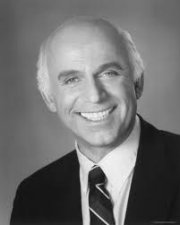
Gavin MacLeod
RETURN TO INDEX |
U.S. Air Force |
American actor most notable for playing Murray Slaughter on
The Mary Tyler Moore Show and Captain Merrill Stubing on
The Love Boat.
Served in the 1950s. |
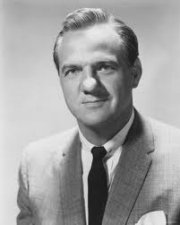
Karl Malden
RETURN TO INDEX |
U.S. Army Air Forces

 |
American actor. In a career that spanned more than seven decades, he
featured in classic
Marlon Brando films such as
A Streetcar Named Desire,
On the Waterfront and
One-Eyed Jacks. Among other notable film roles were Archie Lee Meighan in
Baby Doll,
Zebulon Prescott in
How the West Was Won and General
Omar Bradley in
Patton. His best-known role was on television as Lt. Mike Stone on the 1970s crime drama,
The Streets of San Francisco. During the 1970s and 1980s, he was the
spokesman for
American Express, reminding cardholders "Don't leave home without it".
Served in WW2 as a non-commissioned officer with the 8th Air Force in
the European Theater. |
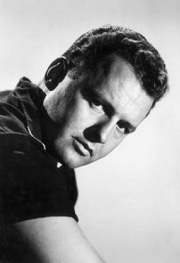
Delbert Mann
RETURN TO INDEX |
U.S. Army Air Forces

 |
American television and film director. He won the Palme d'Or
(Golden Palm) at the Cannes Film Festival and the Academy Award for Best
Director for the film
Marty. Mann is also the only director other than Billy Wilder
and Roman Polanski to win an Oscar for his direction and a Cannes Palme
d'Or for the same film. From 1967 to 1971, he was president of the
Directors Guild of America.
Served in WW2 as a combat pilot of a B-24 Liberator of the 467th Bomb
Group of the Eighth Air Force in England. |
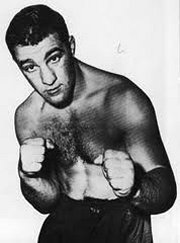
Rocky Marciano
RETURN TO INDEX |
U.S. Army

 |
Italian-American boxer and the
heavyweight champion of the world from September 23, 1952, to April
27, 1956. When he retired he became the only heavyweight champion to
finish his career undefeated.
In March 1943, Marciano was
drafted for a term of two years. Stationed in
Swansea,
Wales, he helped ferry
supplies across the
English Channel
to
Normandy.
After the war ended, he completed his service in March 1946 at
Fort Lewis, Washington. |
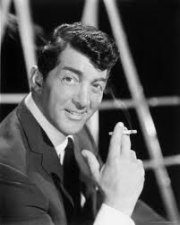
Dean Martin
RETURN TO INDEX |
U.S. Army
 |
American singer,
film
actor,
television
star and
comedian.
Martin's hit singles included "Memories
Are Made of This", "That's
Amore", "Everybody
Loves Somebody", "Mambo
Italiano", "Sway",
"Volare"
and smash hit "Ain't
That a Kick in the Head?". Nicknamed the "King of Cool", he
was one of the members of the "Rat
Pack" and a major star in four areas of show business: concert
stage/night clubs, recordings, motion pictures, and television.
Drafted in 1944 during WW2 he
served a year stationed in
Akron, Ohio.
He was then reclassified as
4-F (possibly because of a double
hernia;
Jerry Lewis
referred to the surgery Martin needed for this in his autobiography) and
was discharged. |

Dino Martin
RETURN TO INDEX |
California Air National
Guard |
American entertainer, noted
as a tennis player, a singer and actor, and a military pilot. Born
Dean Paul Martin, son of performer Dean Martin and his second wife,
Jeanne Biegger. At age thirteen he joined
Desi Arnaz Jr. and
Billy Hinsche in the pop group
Dino, Desi, & Billy, which had a few minor nationwide hits between 1965 and
1968, landing in the Top 30 twice. Martin began to go by his given name of Dean Paul instead of the nickname "Dino"
in his late teens. He became a successful tennis player (he competed in a junior
competition at Wimbledon) and an actor. He co-starred with
Ali MacGraw in the
1979
film
Players, starring as a professional tennis player, for which he was
nominated for a Golden
Globe Award as Best New Star of the Year -- Male. He later starred in the TV series
Misfits of Science
which aired during the 1985 to 1986 television season.
An avid pilot, he obtained his pilot's license at age 16 and became an
officer in the California Air National Guard in 1981. He rose to
the rank of Captain. He died in 1987 when his National Guard F-4
Phantom fighter jet crashed in California's San Bernardino Mountains
during a snowstorm, killing him and his WSO (Weapons Systems Officer),
Captain Ramon Ortiz. |
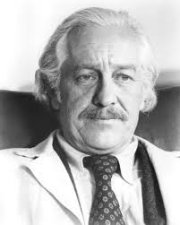
Strother Martin
RETURN TO INDEX |
U.S. Navy

 |
American actor in numerous
films and television programs. Martin is perhaps best known as the
prison "captain" in the 1967 Paul Newman film
Cool Hand Luke,
where he uttered the line, "What we've got here is...failure to
communicate." Martin's distinctive, reedy voice and menacing demeanor made him ideal for
villainous
roles in many of the best-known
Westerns of the 1960s and 1970s, including
The Horse Soldiers
and
The Man Who Shot Liberty Valance. In 1967, he appeared in the
episode "A Mighty Hunter Before the Lord" of NBC's
The Road West. In 1972, he appeared in
the "Zacharia" episode of
Nichols. Martin appeared in all three of the classic Westerns released in 1969:
Sam
Peckinpah's The
Wild Bunch (as Coffer, a bloodthirsty bounty hunter);
George Roy Hill's
Butch
Cassidy and the Sundance Kid (as Percy Garris, the "colorful" Bolivian
mine boss who hires the two title characters); and
Henry Hathaway's
True Grit (as Colonel Stonehill, a horse dealer). Though he usually appeared in supporting roles, he had major parts in
Hannie Caulder,
The Brotherhood
of Satan (both 1971),
Pocket Money (1972), and
SSSSSSS (1973). He also
appeared in the hockey classic
Slap Shot (1977), again with Paul Newman, as the cheap manager of
the Charlestown Chiefs. On televsision he appeared in
I Love Lucy,
Gunsmoke,
Kentucky Jones,
The Legend of Jesse James,
Lost In Space,
Gilligan's
Island, and
The Rockford
Files. One of his last acting jobs was as host of
Saturday
Night Live on April 19, 1980.
Served in WW2 as a swimming instructor in the U.S. |
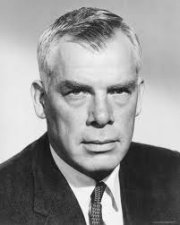
Lee Marvin
RETURN TO INDEX |
U.S. Marine Corps


 |
American film actor known for his gravelly voice, white hair and
6' 2" stature, Marvin at first did supporting roles, mostly villains,
soldiers and other
hardboiled
characters, but after winning an
Academy Award for Best Actor for his dual roles in
Cat Ballou
(1965), he landed more heroic and sympathetic leading roles.
Served
in WW2 as a sniper in the
4th Marine Division. He was wounded in action during the
Battle of Saipan,
during which most of his
platoon were killed. Marvin's wound was from
machine gun fire,
which severed his
sciatic nerve. He
was awarded the
Purple Heart and was given a medical discharge with the rank of
Private First Class. |
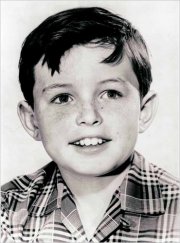
Jerry Mathers
RETURN TO INDEX |
Air National Guard
 |
American television, film, and
stage actor. Mathers is best known for his role in the television
sitcom series Leave It to Beaver (1957 to 1963), in which he played
Theodore "Beaver" Cleaver. His early movies included This is My
Love (1954), Men of the Fighting Lady (1954),
The Seven Little Foys (1955) and
The Trouble with Harry (1955). In 1978, he reentered the
entertainment industry. He has since starred in Playing Patti (1998) and
Better Luck Tomorrow (2002). He has also been in It's Howdy Doody Time
(1987), Down the Drain (1990) and Sexual Malice (1994). He has
also appeared in numerous stage productions.
Served in the Air National Guard from 1966 to 1969. |
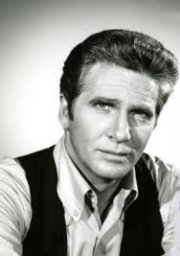
Don Matheson
RETURN TO INDEX |
U.S. Marine Corps
& U.S. Army



 |
American television actor,
best known for his continuing role in Irwin Allen's series
Land of the
Giants. In 1965 Matheson appeared in the
Lost in Space
episode, The Sky Is Falling in the non-speaking roll of the alien Retho
and then in 1968 as Idak Alpha 12 in the episode Revolt of the Androids.
After working in a number of plays, television episodes and commercials,
Matheson was signed to join the cast of the Land of the Giants. In
1984, he had a regular role in the primetime series
Falcon Crest.
He also appeared briefly in another primetime soap,
Dynasty.
Served in the Korean War. Left high school at the age of sixteen,
and continued his education whilst in service in the Marine Corps.
After some time in the Army Airborne division, he was transfered to the
Criminal Investigation Department (CID). He acted as an agent for
the United Nations Command, posted in Korea. Whilst in Korea, he
was awarded the Bronze Star for valorous leadership and a Purple Heart
for injuries suffered in an explosion. His CID work included
investigations in to the use of narcotics amongst Army troops. |
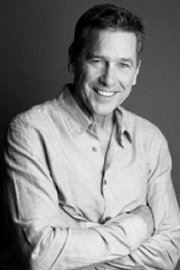
Tim Matheson
RETURN TO INDEX |
U.S. Marine Corps
Reserve |
American actor, director and
producer. He is perhaps best known for his portrayal of the
smooth-talking Eric 'Otter' Stratton in the 1978 comedy
Animal House. At the age of 13, he in the TV comedy series
Window on Main Street (1961 to 1962). In 1964, he provided the
voice of the lead character in the cartoon
Jonny Quest. He was also the voice of Jace in the original
animated series
Space Ghost. He also appeared earlier in the ABC television
comedy series
My Three Sons and
Leave It to Beaver. In 1969, he joined the cast of NBC's
The Virginian. In the fall of 1976, Matheson appeared with
Kurt Russell in the 15-episode NBC series
The Quest. He co-starred in
Animal House (1978) opposite John Belushi; the following year, he
appeared opposite Belushi again in Spielberg's
1941. Matheson starred in the 1984 comedy movie
Up the Creek and the comedy
Fletch. He went on to act in over 100 film and television
projects. In addition to playing Sheriff Matthew Donner in the
short-lived
Wolf
Lake, he has directed episodes of
Third Watch,
Ed,
The Twilight Zone,
Cold Case,
Without a Trace,
The West Wing,
Burn Notice,
Psych,
Shark,
White Collar, and
Criminal Minds. In 2009, Matheson directed the pilot episode
of
Covert Affairs.
Service dates unknown.
|
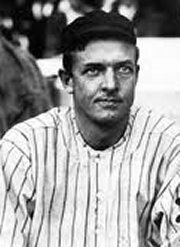
Christy
Mathewson
RETURN TO INDEX |
U.S. Army
 |
American Major League
Baseball right-handed pitcher. He played his entire career in what
is known as the dead-ball era. In 1936, Mathewson was elected into
the Baseball Hall of Fame as one of its "first five" inaugural members.
In 1918, Mathewson enlisted in the United States Army for WW1. He
served overseas as a Captain in the newly formed Chemical Service along
with Ty Cobb. While in France, during a training exercise he was
accidentally gassed and subsequently developed tuberculosis. |
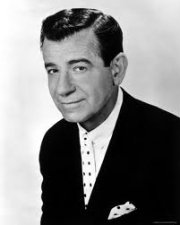
Walter Matthau
RETURN TO INDEX |
U.S. Army Air Forces

 |
American actor best
known for his role as
Oscar Madison
in
The Odd Couple and his frequent collaborations with Odd
Couple star Jack
Lemmon, as well as his role as Coach Buttermaker in the 1976 comedy
The Bad
News Bears. He won an Academy Award
for his performance in the 1966
Billy Wilder
film The
Fortune Cookie.
During WW2 he served with the
Eighth Air Force
in
England as a
B-24 Liberator radioman-gunner, in the same
453rd Bombardment Group as
James Stewart. He reached the rank of
staff sergeant.
|
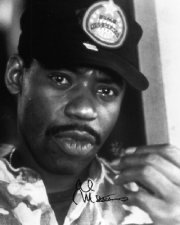
Al Matthews
RETURN TO INDEX |
U.S. Marine Corps


 |
American actor and singer, best known as Sergeant Apone in the 1986
movie
Aliens. He has played various movie roles, including a fire
chief in
Superman III (1983), General Tudor in
The Fifth Element (1997), and Master Sergeant #3 in
Tomorrow Never Dies (1997). He has also worked in British
television and theatre, and has worked in radio, both as an actor (on
BBC Radio 4) and as a presenter for BBC Radio 1 and Capital Radio.
In 1975, he scored his only hit in the UK Singles Chart, "Fool" which
reached number 16 in the autumn of that year.
Served in Vietnam. After 6 years of service he holds thirteen
combat awards and decorations, including two purple hearts. He was
the first black Marine in the 1st Marine Division in Vietnam, to be
meritoriously promoted to the rank of sergeant. He served with
Kilo Battery, Fourth Battalion, 11th Marines, 1st Marine Division. |
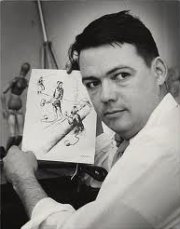
Bill Mauldin
RETURN TO INDEX |
U.S. Army



 |
American two-time Pulitzer Prize-winning editorial cartoonist. He
was most famous for his WW2 cartoons depicting American soldiers, as
represented by the archetypal characters "Willie and Joe", two
weary and bedraggled infantry troopers who stoically endure the
difficulties and dangers of duty in the field. These cartoons were
broadly published and distributed in the American army abroad and in the
U.S.
Served in WW2. Assigned to the 45th Infantry Division, he
volunteered to work for the unit's newspaper, drawing cartoons about
regular soldiers or "dogfaces". In July 1943 as a sergeant
of the 45th Division's press corps, he landed with the division in the
invasion of Sicily and later in the Italian campaign. Mauldin
began working for Stars and Stripes, the American soldiers'
newspaper; as well as the 45th Division News, until he was officially
transferred to the Stars and Stripes in February 1944. In in
September 1943 he was wounded in the shoulder by a German mortar while
visiting a machine gun crew near
Monte Cassino. By the end of the war he also received the
Army's Legion of Merit for his cartoons. |
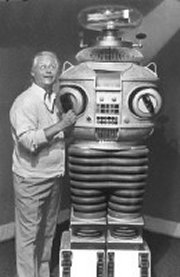
Bob May
RETURN TO INDEX |
U.S. Army |
American actor best remembered for playing The Robot on the television
series Lost in
Space, which debuted in 1965 and ran until 1968. May appeared
in all 83 episodes inside a prop costume built by Bob Stewart. May
became an actor, stage performer, stuntman, director and public speaker,
appearing in several films together with Jerry Lewis, including
The Nutty
Professor. He also performed in several television series,
including The
Time Tunnel,
McHale's Navy and
The Red
Skelton Show. May also worked as a stuntman, performing in
television programs and movies of the 1950s and 1960s, among them
Cheyenne,
Hawaiian Eye,
Palm Springs
Weekend,
Stagecoach,
Surfside 6,
The Roaring Twenties and
77 Sunset Strip.
Was a sergeant, dates unknown. Served with the U.S.O. as an
in-house performer when the outside shows could not reach the camps. Bob
gave much to the entertainment of the soldiers, as he produced and
performed in many productions during his service. |
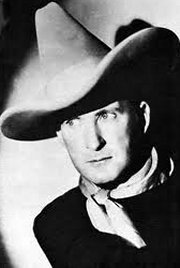
Tim McCoy
RETURN TO INDEX |
U.S. Army
& U.S. Army Air Forces


 |
American actor, military officer, and expert on American Indian life and
customs. Resigning from the Army, he returned to ranching and
concurrently served as territorial Indian agent. In 1922, he
provided Indian extras for the Western extravaganza,
The Covered Wagon
(1923). He brought hundreds of Indians to Hollywood and served as
technical advisor on the film. MGM speedily signed him to a contract to
star in a series of Westerns and McCoy rapidly rose to stardom, making
scores of Westerns and occasional non-Westerns. In 1935, he left
Hollywood, first to tour with the Ringling Brothers Circus and then with
his own Wild West show. He returned to films in 1940, in a series
teaming him with Buck Jones and Raymond Hatton. Hosted local TV
(Los Angeles) with The
Tim McCoy Show (1952) for children on weekday afternoons and
Saturdays in which he provided authentic history lessons on the Old
West.
Served in WW1. Serving again in WW2 in Europe, her rose to the
rank of Colonel with the Army Air Corps. He also served the state
of Wyoming as its Adjutant General between the wars with the brevet rank
of Brigadier General. McCoy spent the war in the U.S. Army and
performed liaison work with the Army Air Forces in Europe, winning
several decorations. At 28, he was reputed to be the youngest
Brigadier General in the history of the US Army. |
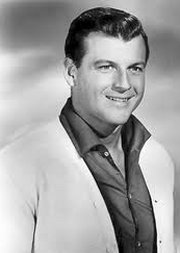
Jody McCrea
RETURN TO INDEX |
U.S. Army |
American film and television actor. He began acting on the 1959 to
1960 television series
Wichita Town with his father. He went on to star in films,
including
Lafayette Escadrille,
The Broken Land, Law of the Lawless, and
Cry Blood, Apache, which he also produced. He was most notable
for his comedic role as dumb-minded "Deadhead" ("Bonehead") in
Beach Party (1963). Other beach movies in which he has
appeared include
Muscle Beach Party,
Bikini Beach, and
Beach Blanket Bingo. He made several television appearances,
including
Wagon Train, Vacation Playhouse, and
The Greatest Show on Earth.
Served in Special Services. |
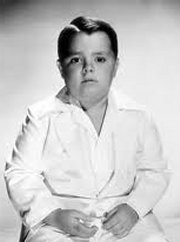
George McFarland
RETURN TO INDEX |
U.S. Air Force
 |
American actor most famous for his appearances as "Spanky" in the
Our Gang series of
short-subject comedies of the 1930s and 1940s. The Our Gang shorts
were later syndicated to television as "The Little Rascals". His
earliest films show him as an outspoken toddler, grumpily going along
with the rest of the gang. His scene-stealing abilities brought
him more attention, and by 1935 he was the de facto leader of the gang,
often paired with Carl "Alfalfa" Switzer, and always the enterprising
"idea man". McFarland's only starring feature-film vehicle was the
1936 Hal Roach film
General Spanky,
an unsuccessful attempt to move the Our Gang series into features.
He also appeared as a juvenile performer in many non-Roach feature
films, including the
Wheeler &
Woolsey comedy Kentucky Kernels and two Fritz Lang features of the
1940s. Following the 1938 Our Gang short
Came the Brawn,
McFarland "retired" from Our Gang, beginning a personal appearance tour.
In the mid-1950s he hosted an afternoon children's show, The Spanky
Show, on KOTV television in Tulsa, Oklahoma. His final television
performance was in 1993, playing himself in the cold open of the
Cheers episode "Woody
Gets An Election".
In 1952, at age 24, he joined the
service. |
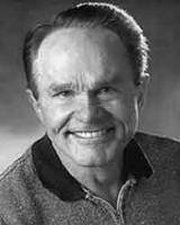
Bill McKinney
RETURN TO INDEX |
U.S. Navy

 |
American character actor whose most famous role was the sadistic
mountain man who abused and then sodomized Bobby Trippe (Ned Beatty) in
the movie
Deliverance (1972). McKinney is also recognizable for his
performances in seven Clint Eastwood films, most notably as Union
cavalry commander Captain "Redlegs" Terrill in
The Outlaw Josey Wales (1976). Other memorable films
The Shootist (1976),
First Blood (1982),
Against All Odds (1984),
Heart Like a Wheel (1983),
Back to the Future Part III (1990), and
The Green Mile (1999). As well as films, McKinney has appeared
in the classic TV movie
The Execution of Private Slovik (1974), while guest-starring on some
of the top TV shows, including
The Young Indiana Jones Chronicles,
Starsky and Hutch,
The
A-Team,
Murder, She Wrote and
Columbo.
Served in the Korean War. Joioned at 19. He served two years
on a mine sweeper in Korean waters, as well as being stationed at Port
Hueneme in Ventura County, California. |
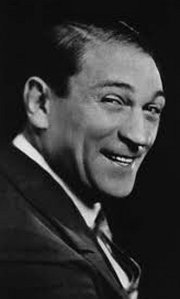
Victor McLaglen
RETURN TO INDEX |
British Army

 |
English boxer who became a successful film actor. Towards the end
of his life he was naturalised as a U.S. citizen. He became a
popular character actor, with a particular knack for playing drunks. He
also usually played Irishmen, leading many film fans to mistakenly
assume he was Irish rather than English. The highlight of his
career was an Academy Award for Best Actor for his role in
The Informer (1935). Between 1920 and 1958 he appeared in over
110 films. Toward the end of his career, he made several guest
appearances on television, particularly in Western series such as
Have Gun, Will Travel and
Rawhide.
Left home at fourteen to join the service with the intention of fighting
in the Second Boer War. However, much to his chagrin, he was
stationed at Windsor Castle with the Life Guards and was later forced to
leave the army when his true age was discovered. In 1913 during
WW1 he served as a Captain (acting) with the 10th Battalion, Middlesex
Regiment, part of The Princess of Wales's Royal Regiment (Queen's and
Royal Hampshires). Later he claimed to have served with the Royal
Irish Fusiliers. He served for a time as military Provost Marshal
for the city of Baghdad. He also continued boxing, and was named
Heavyweight Champion of the British Army in 1918. |
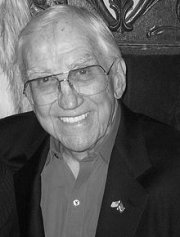
Ed McMahon
RETURN TO INDEX |
U.S. Marine Corps




 |
American
comedian,
game show host and
announcer. He is most famous for his work on television as
Johnny Carson's
announcer and
sidekick on
The Tonight Show from 1962 to 1992. He also hosted the original
version of the
talent
show
Star
Search from 1983 to 1995. He co-hosted
TV's Bloopers and Practical Jokes with
Dick Clark from
1982 to 1986. He also presented
sweepstakes for
the
direct
marketing company
American Family Publishers.
Served as a flight instructor for two years in the continental
U.S., finally being ordered to
the Pacific fleet in 1945. However, his orders were canceled after the
atomic bomb was dropped on
Hiroshima and
Nagasaki forcing
Japan's surrender. As an officer in the reserves, He was recalled
to active duty during the
Korean War.
This time, he flew the OE-1
Cessna O-1
Bird Dog, an unarmed single-engine spotter plane. He
functioned as an artillery spotter for the Marine batteries on the
ground and as a forward controller for the Navy and Marine fighter
bombers. He flew a total of 85 combat missions, earning 6
Air Medals. After the war, he stayed with the Marines, as a
reserve officer, retiring in 1966 as a
Colonel, he was later
commissioned to the rank of
Brigadier
General in the California National Guard. |
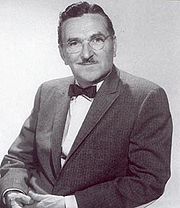
Howard McNear
RETURN TO INDEX |
U.S. Army Air Forces
 |
American film, television and radio character actor. McNear is best
remembered as Floyd
Lawson, the barber in
The Andy
Griffith Show.
Enlisted as a private on November 17, 1942 during WW2.
|
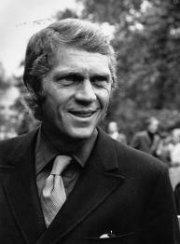
Steve McQueen
RETURN TO INDEX |
U.S. Marine Corps |
American movie actor. McQueen received an
Academy Award
nomination for his role in
The Sand Pebbles. His other popular films include
The
Magnificent Seven,
The Great Escape,
The Thomas Crown Affair,
Bullitt,
The Getaway,
Papillon, and
The Towering
Inferno. In 1974, he became the highest-paid movie star in
the world.
In 1947 was quickly promoted to
Private First
Class and assigned to an armored unit. Was
demoted to private seven times. Went
UA (unauthorized absence) by failing to return after a weekend pass
had expired, resisted arrest and spent 41 days
in the
brig. Resolved to focus his energies on
self-improvement and embraced the Marines'
discipline.
Saved the lives of five other Marines during an Arctic exercise, pulling
them from a tank before it broke through ice into the sea. Assigned to an honor guard responsible for guarding
then-U.S.
President
Harry Truman's yacht. Served until 1950 when he was
honorably discharged. |
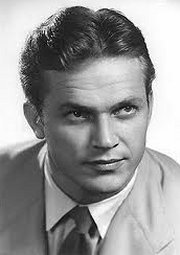
Ralph Meeker
RETURN TO INDEX |
U.S. Navy
 |
American stage and film actor, producer, best-known for starring in the
1953 Broadway production of
Picnic, and in the 1955 film noir cult classic
Kiss Me Deadly.
In 1957, he did co-star in Stanley Kubrick's
Paths of Glory,
playing one of the condemned soldiers. Later films included 1961's
Ada
with Dean Martin and the 1967 drama
The St. Valentine's Day Massacre, in which he played gangster George
"Bugs" Moran. He also appeared in 1967's hit
The Dirty Dozen
as Captain Kinder, a military psychologist who attempts to analyze the
men. Meeker portrayed police officers in 1969's
The Detective with Frank Sinatra and
The Anderson
Tapes (1970) with Sean Connery. He was producer of the movie
My Boys Are Good Boys (1978).
Enlisted after after graduating from Northwestern University in 1942.
Military service ended after a shipboard accident left him with a neck
injury. |
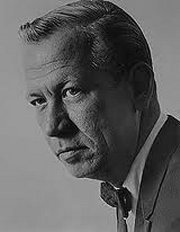
Allan Melvin
RETURN TO INDEX |
U.S. Navy
 |
American
character actor who appeared in several television shows and may be
best remembered for his roles as Corporal Henshaw in
The Phil
Silvers Show;
Sam the Butcher, Alice's boyfriend on
The Brady Bunch;
and Barney Hefner, Archie Bunker's best friend on
All in the
Family and
Archie
Bunker's Place.
Served during WW2. |
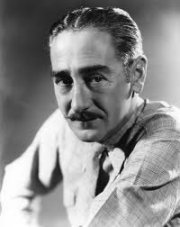
Adolphe Menjou
RETURN TO INDEX |
U.S. Army
 |
American actor. His career spanned both silent films and talkies,
appearing in such films as
The Sheik,
A Woman of Paris,
Morocco, and
A Star is Born. He was nominated for an Academy Award for
The Front Page in 1931.
Served in WW1 as as a captain in the ambulance service. |
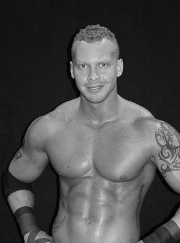
Tommy Mercer
RETURN TO INDEX |
U.S. Army

 |
American professional wrestler, currently signed to Total Nonstop Action
Wrestling (TNA) under the ring name Crimson. He also works for
various promotions on the independent circuit, including Absolute
Intense Wrestling (AIW), NWA Main Event and Showtime All-Star Wrestling
(SAW).
Served for five years which included two tours of Iraq in the 101st
Airborne Division as part of Operation Iraqi Freedom. |
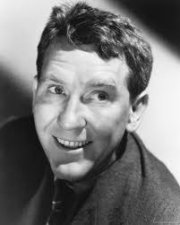
Burgress
Meredith
RETURN TO INDEX |
U.S. Army Air Forces
 |
American actor.
A distinguished theatre director, he won a
Tony Award
nomination for his 1974
Broadway staging of
Ulysses in
Nighttown. Meredith achieved iconic status for playing
The Penguin in the
television series
Batman. He was nominated for
Academy Awards in the Best Supporting Actor category for his roles
in
The Day of the Locust (1975) and
Rocky (1976).
Served in WW2, reaching the rank of Captain. He was discharged in 1944 to work on the movie The
Story of G.I. Joe, in which he starred as the popular war
correspondent
Ernie
Pyle. |
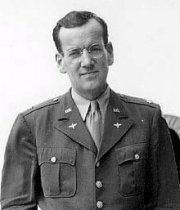
Glenn Miller
RETURN TO INDEX |
U.S. Army
& U.S. Army Air
Forces

 |
American
jazz
musician (trombone),
arranger,
composer, and
bandleader in the
swing era. He was one of the best-selling recording artists from
1939 to 1943, leading one of the best known "Big
Bands". Miller's notable recordings include
In the Mood,
American
Patrol,
Chattanooga
Choo Choo, A String of Pearls,
Tuxedo Junction,
Moonlight
Serenade,
Little Brown Jug and
Pennsylvania 6-5000.
In 1942, at the peak of his
civilian career, Miller decided to join the
war effort. At 38,
Miller was too old to be drafted, and first volunteered for the
Navy but was told that they did not need his services. He then wrote to Army Brigadier General Charles Young
and persuaded the
United States
Army to accept him. He was transferred to the
Army Air Force and served initially as assistant special services
officer for the Army Air Forces Southeast Training Center at
Maxwell Field,
Montgomery,
Alabama, in December 1942. He received permission to form his
50-piece Army Air Force Band and take it to England in the summer of
1944, where he gave 800 performances. While he was traveling to entertain U.S.
troops in
France
during
World War II,
Miller's plane disappeared in bad weather over the English Channel. His
body has never been found. |
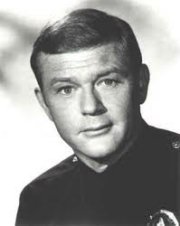
Martin Milner
RETURN TO INDEX |
U.S. Army
 |
American actor best known for his performances in two popular
television series,
Adam-12 and
Route 66.
In 1952, was drafted into the
service. In Special Services at
Fort Ord on
California's Monterey Bay peninsula, he directed training films and,
with fellow actor/soldier
David Janssen,
emceed and performed in skits to entertain the soldiers. Milner
and Janssen encouraged fellow soldier
Clint Eastwood
to pursue an acting career when his time in the Army ended. |
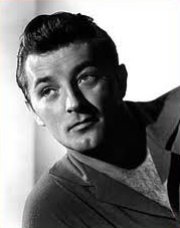
Robert Mitchum
RETURN TO INDEX |
U.S. Army

 |
American film actor, author,
composer and singer and is #23 on the
American Film Institute's
list of the greatest male American screen legends of all time. Mitchum is largely remembered for his starring roles in several major
works of the
film noir
style, and is considered a forerunner of the
anti-heroes prevalent in film during the 1950s and 1960s.
Drafted in WW2, serving at
Fort MacArthur,
California. |
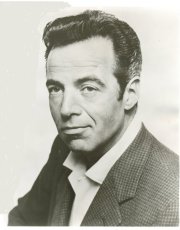
Gerald Mohr
RETURN TO INDEX |
U.S. Army Air Forces
 |
American radio, film and
television character actor who appeared in over 4,000 radio plays, 73
films and over 100 television shows. Mohr excelled in playing the
handsome, charming villain. He appeared in mostly B-movies
throughout his career and starred in My World Dies Screaming aka
Terror in the Haunted House (1958) and A Date with Death (1959),
both of which were filmed in the experimental Psychorama format,
Guns,
Girls, and Gangsters (1959), and
The Angry
Red Planet (1960).
Served in WW2 from 1942 to 1945. |
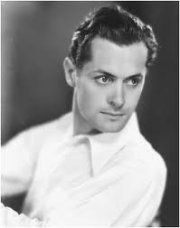
Robert
Montgomery
RETURN
TO INDEX |
U.S. Navy
 |
American actor and director
whose film career spaned over 30 years (1929 to 1960). He was
nominated for the
Academy Award for Best Actor as a psychopath in the chiller
Night Must Fall.
Served during WW2 rising to
the rank of lieutenant commander. |
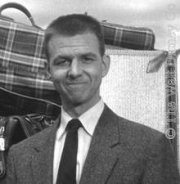
Alvy Moore
RETURN TO INDEX |
U.S. Marine Corps

 |
American light
comic actor best known for
his role as scatterbrained
county
agricultural
agent "Hank
Kimball" on the
television series
Green Acres.
Served in WW2 seeing combat
in the
Battle
of Iwo Jima. |
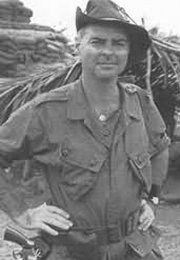
Robin Moore
RETURN TO INDEX |
U.S. Army Air Forces


 |
American writer who is most known for his books
The Green Berets,
The French Connection: A True Account of Cops, Narcotics, and
International Conspiracy and, with Xaviera Hollander and Yvonne
Dunleavy, The Happy Hooker: My Own Story. Moore also co-authored
the lyrics for the "Ballad
of the Green Berets", which was one of the major hit songs of 1966.
The song was also featured in the film based on Moore's book which
starred John Wayne.
Served in WW2 as a nose gunner, flying combat missions in the European
Theater. For his outstanding service, he was awarded the Air
Medal. |
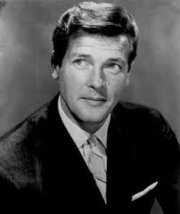
Roger Moore
RETURN TO INDEX |
British Army |
English
actor and film producer, perhaps best known for portraying British
secret agent
James Bond in
seven films from 1973 to 1985. He also portrayed
Simon Templar
in the long-running British television series
The Saint.
At 18 years old, shortly
after the end of WW2, Moore was
conscripted for
National Service. He was commissioned as an
officer and eventually became a
Captain. He served in the
Service
Corps, commanding a small depot in
West Germany. He later transferred to the entertainment branch. |
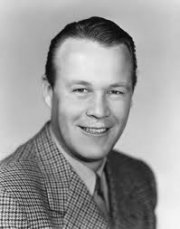
Wayne Morris
RETURN TO INDEX |
U.S. Navy



 |
American film and television actor, as well as a decorated World War II
fighter ace. He appeared in many notable films, including
Paths of Glory
(1957),
The Bushwackers (1952) and the title role of
Kid Galahad in
1937.
Morris was considered by the Navy as physically 'too big'
to fly fighters. After being turned down several times as a
fighter pilot, he went to his brother in law, Cdr. David McCampbell,
imploring him for the chance to fly fighters. Cdr. McCampbell said "Give
me a letter." He flew with the
VF-15,
the famed "McCampbell Heroes." While filming
Flight Angels (1940), Morris became interested in flying and became
a pilot. With war in the wind, he joined the Naval Reserve and became a
Navy flier in 1942, leaving his film career behind for the duration of
the war. Flying the
F6F Hellcat off the aircraft carrier
USS Essex (CV-9), Morris shot down seven Japanese planes and
contributed to the sinking of five ships. He was awarded four
Distinguished Flying Crosses and two
Air
Medals.
|
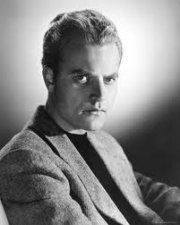
Vic Morrow
RETURN TO INDEX |
U.S. Navy
 |
American actor, whose credits include a starring role in the 1960s
TV series
Combat!,
prominent roles in a handful of other television and cinema dramas, and
numerous guest roles on television.
Dropped out of high school
at 17 to joined the
service in 1946.
|
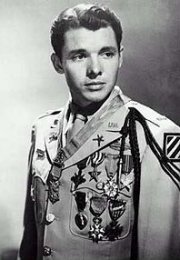
Audie Murphy
RETURN TO INDEX |
U.S. Army








 |
After the war he became a celebrated movie star for over two decades,
appearing in 44 films. He also found some success as a country
music composer. Murphy's successful movie career included
To Hell and Back (1955), based on his book of the same title
(1949).
Murphy became the most decorated
United States soldier of the war during twenty-seven months in action in
the
European Theatre. He received the
Medal of Honor,
the U.S. military's highest award for valor, along with 32 additional
U.S. and foreign medals and citations, including five from France and one from Belgium. |
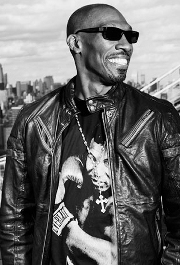
Charlie Murphy
RETURN TO INDEX |
U.S. Navy |
American actor, comedian, and
writer notable as being a cast member and writer on the Comedy Central
sketch-comedy series
Chappelle's Show. He is also known for his work with his
younger brother Eddie Murphy.
Served from 1978 to 1984 as a Boiler Technician aboard a ship. |
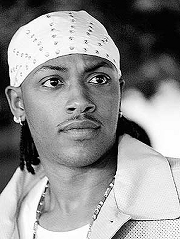
Mystikal
RETURN TO INDEX |
U.S. Army

 |
American rapper and actor born
Michael Lawrence Tyler.
Served during Desert Storm in 1991. |
|

